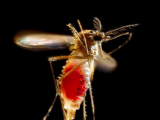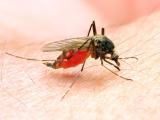An oral capsule that unfolds into a star shape once it enters the stomach can deliver long-acting malaria protection that might offer a new weapon against the disease, and there's hope that the new drug delivery system could also help battle other diseases—such as tuberculosis and HIV—that require strict medication adherence.
A research team based at the Massachusetts Institute of Technology (MIT) reported the first promising results today from tests on pigs, plus mathematical modeling estimates showing how the new drug-delivery method could fit into malaria elimination strategy. They published their findings in the latest edition of Science Translational Medicine.
In another key malaria development today, researchers from the World Health Organization (WHO) unveiled research affirming the disease-cutting effects of treated bed nets in parts of Africa that bear a heavy malaria burden, even in areas where the mosquitoes are resistant to the insecticide.
Long-acting platform may prove versatile
The malaria drug study marks the one of earliest applications of the new platform, which was initially developed at MIT and is now licensed by Lyndra, an early-stage biotechnology company based in Cambridge, Mass.
The oral capsule used in the study is about the size of a fish-oil supplement and contains polymers and other materials mixed with ivermectin, used to interrupt the spread of malaria and other parasites. Once in the stomach, the size and star shape of the unfolded capsule keeps it there long enough deliver therapy for 7 days or longer before it breaks down and passes through the gastrointestinal tract. In experiments with pigs, researchers showed long-acting controlled release of ivermectin for 2 weeks.
C. Giovanni Traverso, MB BChir, PhD, a gastroenterologist and biomedical engineer at Brigham and Women's Hospital (BWH) and Harvard Medical School, said in a BWH press release that the team designed the capsule to pause its transit in the stomach to allow for more controlled drug delivery and absorption. "Some of the challenges we face in getting the capsule in place are the 'ship in the bottle problem'—in this case, the neck of the bottle is the esophagus—and preventing the capsule from passing through the rest of the tube."
Using mathematical models based on human field data, collaborators at Imperial College London and the Institute of Disease Modeling in Seattle found that long-lasting ivermectin blood levels could boost the efficacy of mass drug administration campaigns aimed at eliminating malaria.
The researchers said they hope to start clinical trials in the middle of 2017 and that they are interested in continuing to develop the drug delivery system so that it can slowly release the drug for 1 month or longer.
They say the tool could have other applications beyond infectious disease, to include chronic health problems such as psychiatric, heart, and renal conditions.
Traverso said the goal is to make it as easy as possible for people to take their medications over a longer period. "When patients have to remember to take a drug every day or multiple times a day, we start to see less and less adherence to the regimen. Being able to swallow a capsule once a week or once a month could change the way we think about delivering medicines."
One of the paper's first authors, Andrew Bellinger, MD, PhD, a cardiologist at BWH and chief scientific officer at Lyndra, said the new drug delivery system may also reduce side effects and improve drug efficacy by smoothing out serum concentration variability that often goes hand-in-hand with taking a daily pill.
Amy Schulman, JD, Lyndra's cofounder and chief executive officer, said in a company press release that about 50% of people don't take their medicines as prescribed, which according to estimates, costs the US healthcare system more than $100 billion each year. "Lyndra's long acting technology should make a real dent in this protracted problem and help change the lives of millions of patients who feel tethered to the daily pill."
Long-lasting treated bed nets
In another malaria research development, a 5-year study by the WHO involving five countries found that bed nets treated with insecticide still offer significant protection from mosquitoes that transmit the disease, despite the rise in insecticide resistance. Researchers presented their findings, the most comprehensive evaluation ever to gauge the impact of insecticide resistance on essential malaria control tactics, today in Atlanta at the annual meeting of the American Society of Tropical Medicine and Hygiene (ASTMH).
Long-lasting insecticidal nets (LLINs) have been a key tool for decreasing malaria infections and deaths worldwide since 2000.
The researchers, with the support of the Bill and Melinda Gates Foundation, found that people who slept under LLINs in 340 locations from five countries (Benin, Cameroon, India, Kenya, and Sudan), had significantly lower rates of malaria than those who didn't use a net, despite the fact that mosquitoes showed resistance to insecticides in all of the locations.
Access to LLINs in sub-Saharan Africa from 2000 to 2015 rose from less than 2% to 53%. The WHO estimates that 663 malaria infections were prevented from a combination of interventions, with LLINs averting 69% of the illnesses. They noted that even where mosquitoes developed resistance to the insecticide used in the LLINs—pyrethroids—treated nets can still kill them.
Tessa Knox, PhD, one of the WHO researchers, said in an ASTMH press release, "A resistant mosquito may not die immediately after landing on a net, but it could continue to absorb insecticide as it seeks a way to get through and bite a person beneath the net. This may eventually kill the mosquito and stop onward transmission of malaria parasites."
She added that the findings hint resistance is not an all-or-nothing proposition and that pyrethroids likely retain some level of impact in many areas.
The WHO group said, however, that resistance to insecticides is still a growing concern and that all countries with ongoing malaria transmission need to develop and apply effective insecticide-resistance management steps.
Stephen Higgs, PhD, president of the ASTMH, said the study's findings are encouraging, suggesting that there is still time to battle insecticide resistance. "However, we must take advantage of the time we now have to invest in research and generate new tools that will allow us to finally defect this complex and challenging disease."
See also:
Nov 16 Sci Transl Med abstract
Nov 16 MIT press release
Nov 16 BWH news release
Nov 16 Lyndra press release
Nov 16 American Association for the Advancement of Science press release on the drug study
Nov 16 ASTMH press release
Nov 16 WHO study brief





















